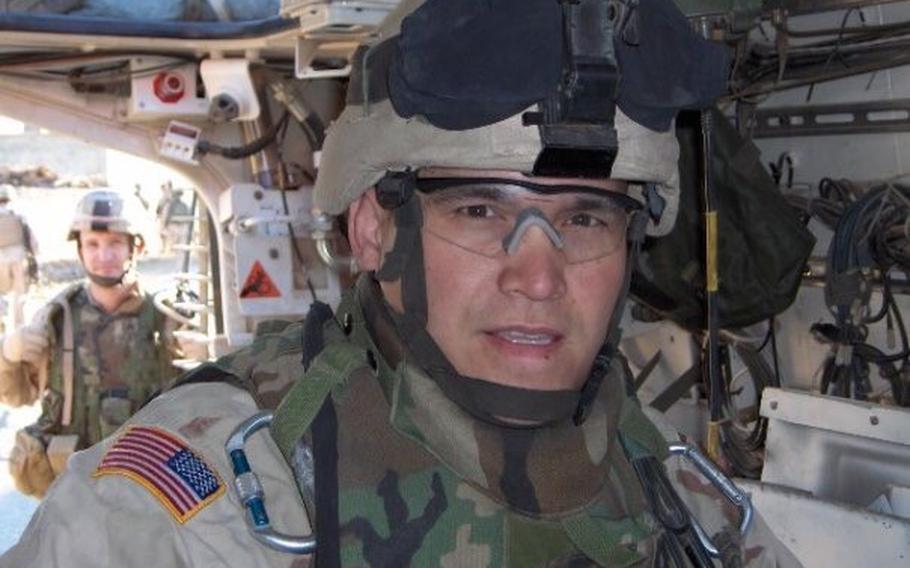
Ronald Schow as an Army captain during his 2004 deployment to Iraq. (Photo provided by Ronald Schow)
A retired Army officer whose promotion to major was botched in an administrative error lost his lawsuit against the government to get his rank corrected and receive back pay, according to federal court documents.
Ronald Schow, 53, has spent more than a decade fighting to right the mistake and said this final court decision against him was disappointing and exhausting.
“The judge was very sympathetic,” he said Wednesday. “But she provided a traceable, defendable decision that isn’t what we wanted.”
Schow was slated for promotion from captain to major in 2006, yet the Army inadvertently left his name off the list that service officials sent to the Senate for confirmation — a step required by law. The service still sent Schow a promotion order that his unit believed to be accurate, and the mistake went unknown to him until the Army attempted to promote Schow again six years later.
Schow retired to Indiana as a captain in 2017 and — after exhausting all administrative options — filed the lawsuit in 2023 in Federal Claims Court aiming to get $180,000 in back pay that he would have received had he retired as a major and increase his retirement pay going forward.
“The amount of money that we’re talking about was never a life-changing amount of money. More importantly, it was vindication,” Schow said.
In an 11-page decision, Judge Elaine Kaplan carefully laid out each detail of Schow’s case and weighed it against the law.
“[The court] also recognizes that Mr. Schow bears no blame for the Army’s mishandling of his promotion and is the victim of an injustice. Regrettably, however, the court does not believe that it can find him ‘entitled’ to pay of a position to which he was not lawfully appointed,” she wrote in her decision.
While Schow represented himself in court, he had help from Matt Freeman, a former Army attorney.
“It’s a shame that between the agency and the court that we couldn’t find some type of resolution for him. Honestly, the resolution we’re asking for, it’s peanuts compared to what he is owed,” Freeman said.
Schow wore the rank of major for seven years and from the moment he returned to being a captain he said he felt a stigma. Demotions typically occur as discipline and explaining such an odd mistake was too unbelievable for many.
His service paperwork says he spent 17 years as a captain, which is hard to summarize in an employment cover letter, Schow said.
The Army did try to rectify the problem and get Schow’s promotion to major confirmed by the Senate, but it did not happen. Schow had been part of an investigation into detainee abuse stemming from a 2004 deployment to Iraq. Schow was reprimanded for the incident, and the Army still selected him for promotion to major.
Schow was told at the time that the detainee investigation made senators unwilling to approve him.
The service in 2012 conducted an administrative investigation into the promotion mix-up and found a longtime civil servant was hospitalized during the 2006 promotion cycle, which likely led to inexperienced staff flubbing paperwork.
The Army labeled the seven years that Schow spent as a major as a de facto status, meaning in practice he was a major. This allowed him to keep the pay and benefits that he earned during that time based on a century-old Supreme Court ruling.
Schow’s lawsuit argued the Supreme Court ruling should also require the Defense Finance and Accounting Service, known as DFAS, to use his time as a major to calculate his retirement pay. It’s known as the High-36 retirement rule, which uses the three highest earning years of base pay to calculate retirement. The Army requested the agency do so when it submitted information for Schow’s retirement, though the service has no authority over the decision.
Given the judge’s ruling, Schow is now weighing his options. He has 60 days to appeal the decision.
“The Army was not transparent at all, and I had to learn along the way what the full implications of what was going on really meant. Because of the lack of transparency, I was robbed of agency to make decisions on my own behalf,” he said.
In reviewing the Army’s administrative investigation into the matter, Schow said he learned the Directorate of Military Personnel Management knew just months after his promotion to major in 2006 that his packet lacked Senate confirmation. No one followed up on the error nor did anyone notify him.
The directorate again noticed the error in May 2011 when Schow was selected for promotion to lieutenant colonel, yet no one notified him until November 2012 — nine months after the Army had begun its review.
“Because of the extreme amount of time that went by, it exasperated the impact,” Schow said. “I could have pursued other things and done other things. Instead, I moved forward [in the Army], and I worked hard.”
That is where he believes Congress can help find a way to improve advocacy for troops in odd situations such as this. The Army had an obligation to fix the error, but it also had an interest in minimizing its own exposure, Schow said.
“Who is advocating for the service member when the potential impact is professional embarrassment, impacts to your retirement and many, many things on a financial level?” Schow argued.